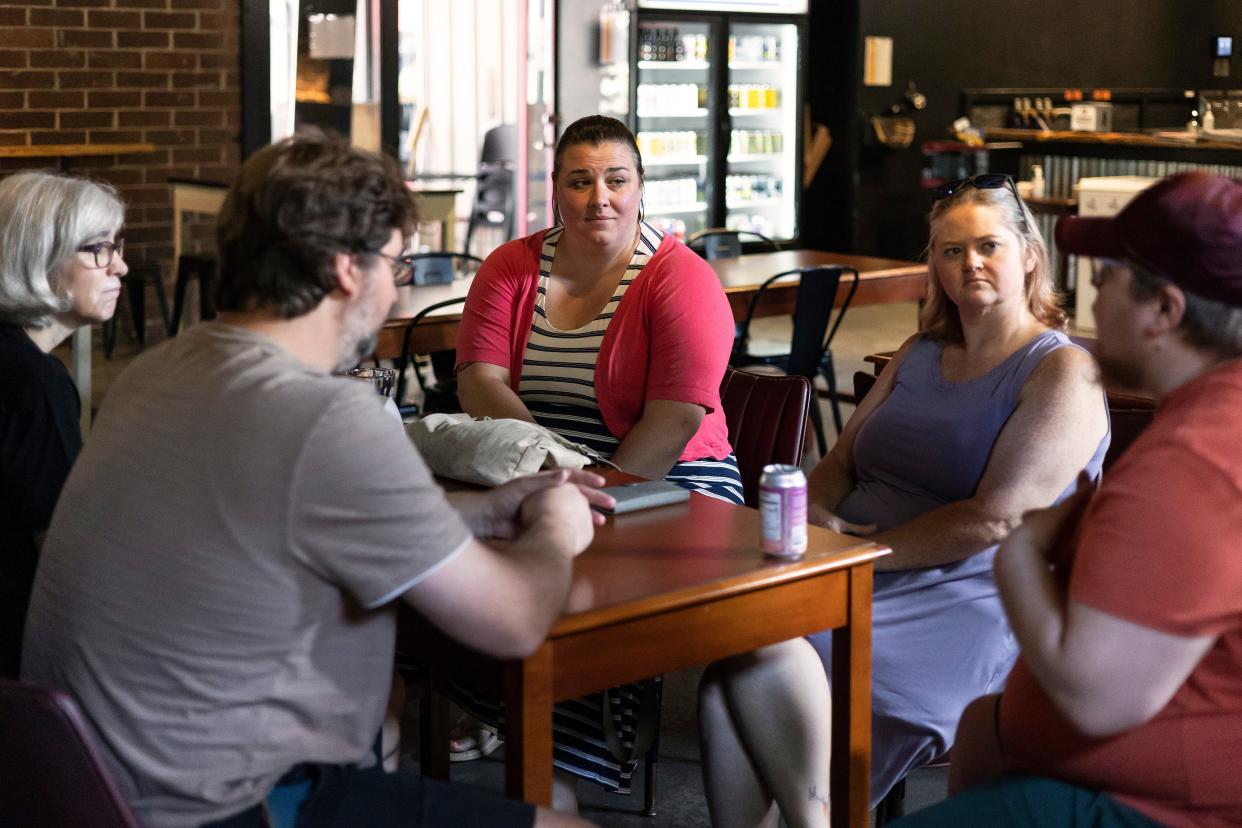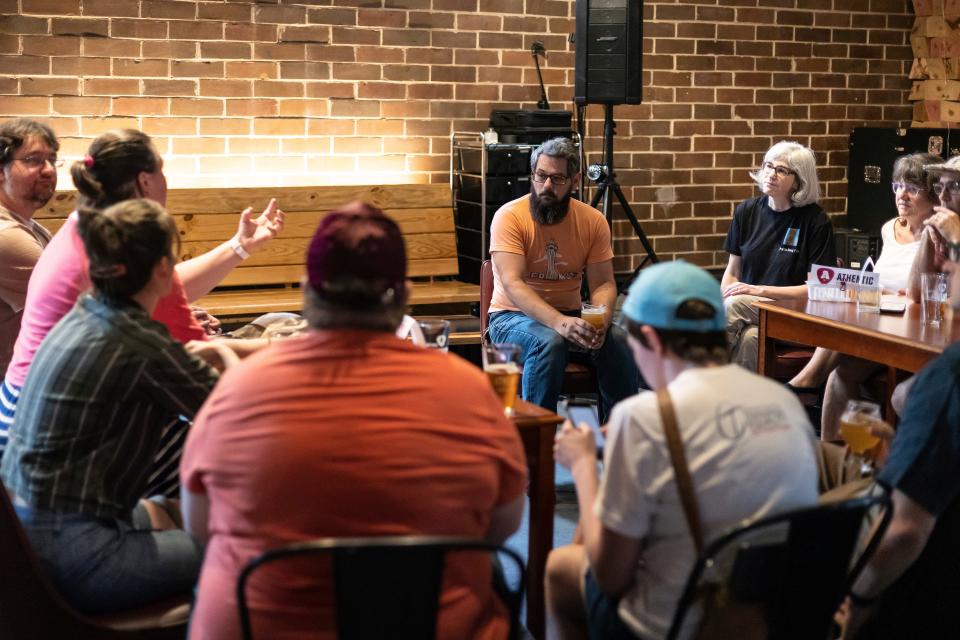Not Church group nourishes Athens spiritually and literally, now helping feed the homeless

Rev. Laura Patterson of Oconee Street United Methodist Church believes you can find fellowship in unlikely places. Not Church, a fellowship organization she helped found in 2019, was no exception.
"We were meeting on Sunday afternoons and the breweries were not open at 6 (p.m.) on Sundays. We couldn't meet at a restaurant because we were bringing our own food in," she said. "So we would meet in my CrossFit gym."
Not Church began as a loose network of friends interested in sharing meals and theological conversations outside the traditional confines of the church. Three years after its inception, it now plays a major role in supporting homeless people in Athens.
Every two weeks, Not Church makes hot meals and bagged lunches for their homeless neighbors. A liaison through Mutual Aid Athens distributes the meals to campsites scattered throughout the city.
Progress at 1st Step: Those with Athens' government-sanctioned homeless encampment cite progress after 5 months
Methodists split: Georgia’s Methodists face growing divide over tradition, LGBT inclusion
Opinion: What can we do about falling Church attendance?
While cooking together, members openly discuss faith and spirituality, asking questions that Not Church member Rachel Butts said wouldn't come up during your average church service.
"It was always discussed as a very open environment [where] you could truly come with questions, with doubt, with disbelief even and be welcomed," she said.
From CrossFit potlucks ...
Patterson came up with the idea for Not Church in the course of her own conversations with friends. They'd discuss ethics, social justice, life and religion's place in all of it.
"We'd have these great conversations," she said. "But I also knew these were people that never were going to come into a church."
Many were spiritual, but didn't like the constraints of a traditional church. Others had experienced religious abuse. Still others were struggling with their faith in God, and wanted to wonder about it in a judgment-free community.
"I invited everybody to Hi-Lo one night," said Patterson. "I was like, 'Hey, you guys sort of know each other a little bit. ... All these individual conversations that I'm having with you, like, let's have them together and let's do it on purpose.'"
Their Sunday potlucks at the gym were a hit. But their meetings would change dramatically when the COVID-19 pandemic took hold across the country in March 2020.

... To community service
In December 2020, Patterson began working with Mutual Aid Athens, a network providing money and resources to Athenians in need. The group had a particular focus on the homeless living throughout Athens. Patterson, who had experience cooking for crowds, volunteered her services as a cook, making 50 meals every week for displaced people.
Not Church began meeting in person again in mid-2021. Instead of the usual potluck, Patterson suggested they get together to make bagged lunches. Eventually, that became standard meeting procedure: gathering in the kitchen of Oconee Street UMC to make 50 meals for homeless Athenians.
What began as a weekly get-together between six friends soon grew to a network of two dozen members. Now, Not Church uses Instagram to solicit food donations and connect with new volunteers. That's how Butts found the group.
"The concept of Not Church where you get together, you're talking about Jesus but you're doing something for your local community — that is what appealed to me more than anything," she said.
The future of church (and Not Church)
Butts feels closer to God doing acts of service.
"Jesus was a servant leader. He was a person of the people," she said. "And for me, that's where I experienced the godliness of it."
In 2020, tens of thousands of mutual aid networks emerged throughout the United States in response to COVID-19 and the crisis of police brutality. Butts and other members were taken with a model of reciprocal community support: caring for their neighbors, not offering them charity.
But Butts found that her Southern Baptist church was not up to the task.
"They talked a lot about caring for people," she said. "When it came time for rubber to hit the road, they would end up spending their money on building a new atrium or buying a new XYZ for the church, when you know that money would be better spent helping someone in need."
What's more, traditional churches seemed less open to questions about religion, even when those questions come from a faithful Christian.
"I think a lot of a lot of mainstream churches would would have a lot to say about Not Church," she said. "I think that they would they would argue that it is maybe blasphemous or sacrilegious or whatever, based on their perspective of what it means to be religious."
Opinion: The role of churches in supporting young men and stopping mass shootings
In case you missed it: Through COVID and isolation, Piedmont Athens hospital chaplains hold fast to faith
The majority of Not Church's members are millennials or Gen Z: people who came up during the Evangelical boons of the 1980s and early 2000s, yet now boast some of the lowest church attendance rates of any age group. Though churches have long complained about sinking attendance rates, Butts says few have actually done anything to keep young people in the pews.
"There's very rarely a question of, 'Why is this happening?'" she said. "They're more focused on, like, 'Let's find a way to get them back without having to make any significant changes to what we're doing or what we're saying or what we're feeding people.'"
Not Church has served as a haven for its millennial members and as an important link in the chain of Athens' mutual aid groups. But it could also serve as a glimpse into the possible future of religion: an open, community-centric model of Christianity.
"I think churches are gonna have to become more truly affirming of all people," said Butts. "I think they're gonna have to be more open to multiple perspectives and multiple lenses for spirituality."
This article originally appeared on Athens Banner-Herald: Not Church of Athens expands its mission to help feed the homeless

